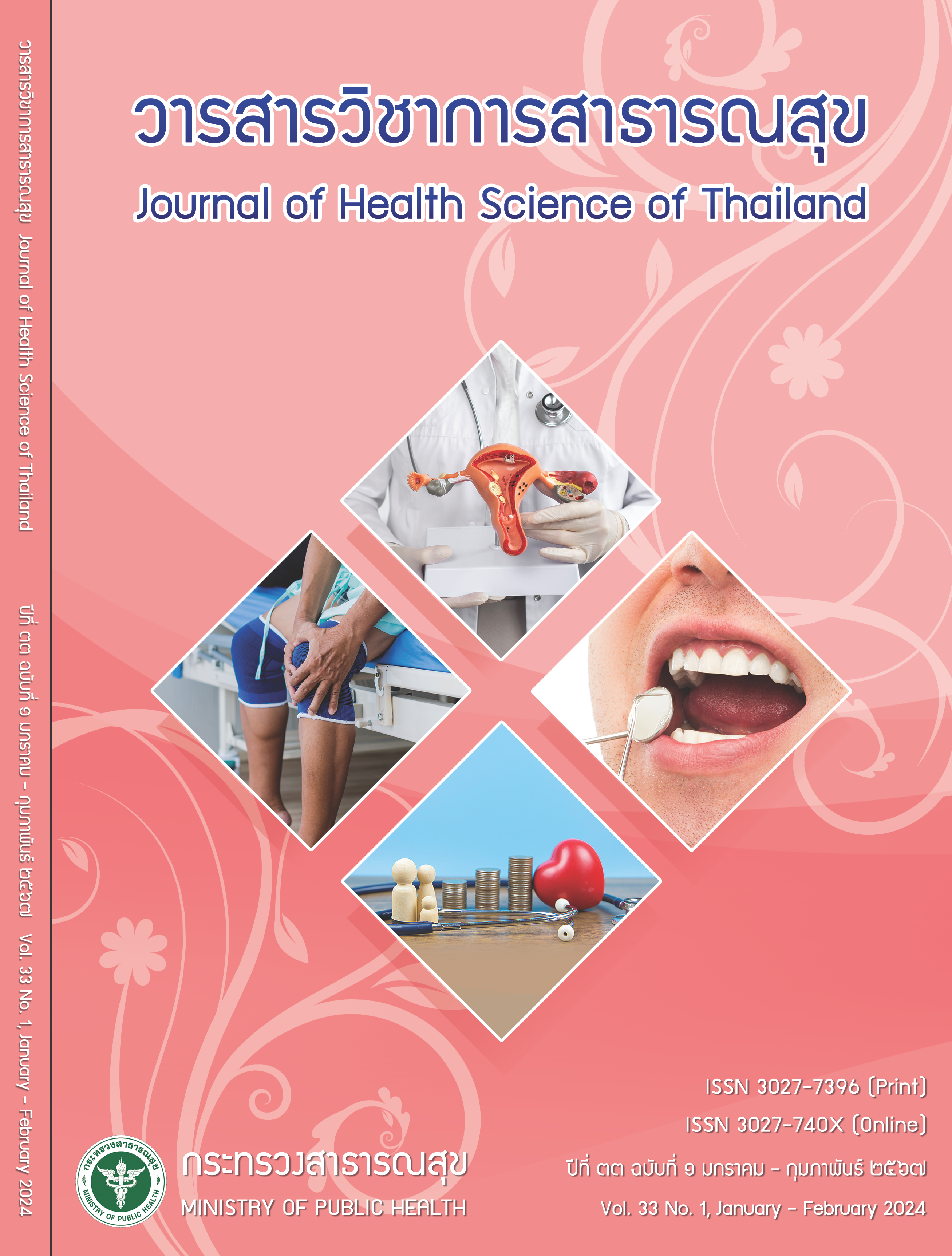Effectiveness of the APE-AI Model on Self-Efficacy in Managing the Risk of Sexually Abusive Behavior and Improving the Quality of Life Among Muslim Adolescents in the Deep South Thailand
Abstract
The objectives of this research and development were to study lifestyle causes of inappropriate sexual behavior and lifestyle of school-age mothers and to synthesize guidelines for taking care of school-age mothers so that they could lead a normal life. In addition, it was aimed to develop a risk management model for inappropriate sexual behavior and improvement of the quality of life of Muslim adolescents in the three southern border provinces; as well as to assess the level of self-efficacy in managing the risk of inappropriate sexual behavior and improving the quality of life. Study samples were 30 students for in-depth interview. Focus group discussion were conducted among 30 informants. Research instruments were a model to manage the risk of sexually inappropriate behavior and improve the quality of life of adolescent mothers in the three southern border provinces (APE-AI Model) and the self-efficacy level scale for risk management of inappropriate sexual behaviors and quality of life improvement among Muslim adolescents. Validity of questionnaire was tested using item-objective congruence Index, yielding a value of 0.86. Reliability was tested using Cronbach’s alpha coefficient, yielding a value of 0.89. Data were analyzed using Paired t-test. The results showed that lifestyle reasons for having children at school age were caused by parents who did not understand and did not have time for the adolescents, lack of knowledge and skills about safe sex, improper use of technology media, the use of religious principles to solve sexual behavior problems (Haram), lack the opportunity to continue education, and insufficient income to cover expenses. A risk management model for inappropriate sexual behavior and improving the quality of life of adolescent mothers was developed which incorporated the context of the southern border region. It consisted of decision-making skills improvement and appropriate coping mechanism (self-efficacy), receiving help from family. experts and related agencies, developing safe sex knowledge and skills and sharing experiences on sexual behavior, impact, and roles of adolescent mothers. After the implemmentation, the students had a significant increase in the level of self-efficacy in managing the risk of inappropriate sexual behavior. and improving the quality of life (p<0.05). Therefore, the developed model could be used in educational institutions to prevent teenage pregnancy and inappropriate sexual behaviors of adolescents within a Muslim cultural context.
Downloads
References
สาลินี แนวหล้า, ปริญญา ผกานนท์. ทัศนคติและพฤติกรรม เสี่ยงทางเพศของวัยรุ่น จังหวัดอุบลราชธานี. การประชุมวิชาการและนาเสนอผลงานวิจัยระดับชาติราชธานีวิชาการ ครั้งที่ 1 “สร้างเสริมสหวิทยาการ ผสมผสานวัฒนธรรมไทย ก้าวอย่างมั่นใจเข้าสู่ AC”; 29 ก.ค. 2559; ณ มหาวิทยาลัยราชธานี. อุบลราชธานี: มหาวิทยาลัยราชธานี; 2559. หน้า 1584-91.
Word Health Organization. Adolescent pregnancy [Internet]. [cited 2020 Oct 2]. Available from: https:// www.who.int/news-room/fact-sheets/detail/adolescent-pregnancy
นินาวาลย์ ปานากาเซ็ง. โครงการวิจัยส่งเสริมเครือข่ายการ รวมพลังแม่วัยเรียนในบริบทภาคใต้ชายแดน. ปัตตานี: มหาวิทยาลัยสงขลานครินทร์; 2561. 185 หน้า.
อวาทิพย์ แว, ฮูดา แวหะยี. บริบทการจัดการความเสี่ยงต่อ พฤติกรรมทางเพศที่ไม่เหมาะสมและแนวทางการพัฒนา คุณภาพชีวิตของแม่วัยรุ่น ใน 3 จังหวัดชายแดนภาคใต้. การประชุมวิชาการสุขศึกษาแห่งชาติ ครั้งที 20; 19-20 พ.ค.2565; คณะสาธารณสุขศาสตร์ มหาวิทยาลัยมหิดล. กรุงเทพมหานคร: คณะสาธารณสุขศาสตร์ มหาวิทยาลัยมหิดล; 2565. หน้า 280-92.
Crabtree BF, Miller WL. A template approach to text analysis: developing and using codebooks. In: Crabtree BF, Miller WL. Doing qualitative research. Newbury Park, CA: Sage Publications; 1992. p. 93-109.
Becker MH, Maiman LA. The health belief model and sick role behavior. Health Education Quarterly 1984;11(1):1-47.
Bandura A. Self-efficacy: toward a unifying theory of behavioral change. Psychological Review 1997; 84(2):191-215.
บุญใจ ศรีสถิตนรากุล. ระเบียบวิธีวิจัยทางการพยาบาล.. กรุงเทพมหานคร: จุฬาลงกรณ์มหาวิทยาลัย; 2553.
Hair Jr JF, Black WC, Babin BJ, Anderson RF. Multivariate data analysis: a global perspective. 7th ed. Upper Saddle River, NJ: Pearson Education; 2014.
ทัศณีย์ หนูนารถ, เบญจวรรณ ละหุการ. การสื่อสารเรื่องเพศ ในครอบครัวมุสลิม. วารสารวิจัยและนวัตกรรมทางสุขภาพ 2562;2(2):51-62.
อัครวัฒน์ ราตรีสวัสดิ์ , ศุภฤกษ์์ โพธิิ ไพรรัตนา.พฤติกรรม การสื่อสารและการเรียนรู้พฤติกรรมทางเพศของเยาวชน ในจังหวัดเชียงใหม่. วารสารสื่อสารมวลชน 2564;9(1):26- 51.
สุชาติ รัตถา, เรขา อรัญวงศ์, รัชนี นิธากร. การพัฒนารูปแบบการป้ องกันและแก้ไขปัญหาการตั้งครรภ์ก่อนวัยอันควร ของวัยรุ่นในจังหวัดกำแพงเพชร. วารสารมนุษยศาสตร์และ สังคมศาสตร์ บัณฑิตวิทยาลัย มหาวิทยาลัยราชภัฏพิบูล สงคราม 2560;9(2):142-60.
สุทัตตา พานิชวัฒนะ. การรับรู้ความสามารถของตนเอง ทรัพยากรในงาน และความผูกพันในงาน ของพนักงาน ฝ่าย ทรัพยากรบุคคลของบริษัทเอกชนแห่งหนึ่ง [วิทยานิพนธ์ ศิลปศาสตรมหาบัณฑิต]. กรุงเทพมหานคร: มหาวิทยาลัย ธรรมศาสตร์; 2560. 201 หน้า.
Downloads
Published
How to Cite
Issue
Section
License
Copyright (c) 2024 Ministry of Public Health

This work is licensed under a Creative Commons Attribution-NonCommercial-NoDerivatives 4.0 International License.







